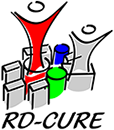RD-Cure Gene Therapy Trials

With an estimated prevalence of 1:4 000 and approximately 1 million affected patients worldwide, retinal dystrophies are a major cause of visual disability. The different forms of retinal dystrophies can be attributed to mutations in more than 100 genes. To date, no cure is available for routine and general application. Researchers are currently investigating the potential for gene therapy in treating retinal dystrophies. Up to now, gene therapy in humans is only performed within clinical trials.
The Centre for Ophthalmology of the University Hospital Tübingen collaborates with partners of the Ludwig-Maximilian-University in Munich and the Columbia University in New York on the clinical translation of gene therapy for retinal dystrophies. To achieve this goal, a consortium of clinicians and researchers with complementary expertise has been assembled and started work in October 2012. The project is funded by the Tistou & Charlotte Kerstan Foundation.
From the group of retinal dystrophies, the RD-Cure-Consortium has selected two genetic subforms – CNGA3-associated Achromatopsia (Study 1) and PDE6A-associated Retinitis Pigmentosa (Study 2) – for which a therapeutic approach for application in clinical trials shall be developed. Both studies will make use of a supplementary gene therapy targeting retinal cells. Supplementary gene therapy aims at a restoration of insufficient or lacking gene function as a result of a pathogenic mutation. Recombinant adeno-associated viral vectors will be used for retinal gene transfer.
The clinical phase of Study 1 has already started and will be completed by the end of 2016. The clinical phase of Study 2 is expected to start in 2017.
